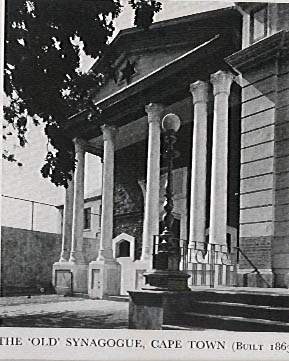Southern Africa Jewish Genealogy SA-SIG
H i s t o r i c a l B a c k g r o u n d
Editor: Dr Saul Issroff
Copyright © 2001 Saul Issroff, Mike Getz, SAfrica SIG
and Jewishgen Inc.
URL: http://www.jewishgen.org/SAfrica/histback.htm
Revised: 13 April 2001

|
The Portuguese voyages around the Cape to the east started in the 15th century. The voyages of Vasco Da Gama 1452 involved Jews as mapmakers, navigators and sailors. The Portuguese were not interested in settling in the Cape, but used it as a route to the profitable trading areas of Asia.
Dutch colonists led by Jan van Riebeck (1652) made the first permanent settlement. The earliest recorded Jews were Samuel Jacobson and David Hijlbron, who converted to Christianity by baptism on Christmas Day in 1669 (these are records of these baptisms in the registers of the Dutch Reformed Church).
Under the control of the Dutch East India Company from 1652 to 1795 only Protestant Christians were permitted to reside at the Cape (despite a significant number of Jewish shareholders in the company). This was in contrast to the Dutch West India Company which sent two hundred Jews in 1642 to colonise Brazil.
Greater religious freedom was permitted under the short lived Batavian Republic in 1803 and was maintained after the British took control in 1806. The British government gave assisted passage and land grants in 1820 to people willing to settle in the Cape Colony. This first group of settlers were known as the 1820 settlers. About sixteen Jews arriving amongst the 1820 Settlers; by the 1860’s other European Jews started to arrive from Germany and Holland.
Among the early Jewish settlers were colourful characters such as the soldier Isaac Moses, known as "old Moses the Moneychanger" and Joseph Suasso de Lima of Amsterdam who started the first Dutch newspaper in SA. Nathaniel Isaacs, an early explorer of Natal befriended the famous Zulu chief, Chaka and was a Jew. Early British families include De Pass, who played a major part in the establishment of the shipping, sugar and fishing industries. Saul Solomon founded the English press in Cape Town; when he converted he retained a prominent position in the Jewish community.
An English Jew, Benjamin Norden founded the first Jewish congregation in 1841 in Cape Town. He was one of several Jews who arrived in the eastern Cape as part of the 1820 Settlers- the first real British attempt to provide permanent colonial settlement. Most of these early Jewish settler families have now totally assimilated.
There were about 4000 Jews in the country by 1880. Thereafter Jewish immigration increased rapidly. Major factors leading to this were:
- pogroms (1881-1884) and other catastrophes
- droughts
- floods
- deportation
- fires particularly in Kovno Gubernia
- general economic deprivation
The general run of settlers were not refugees and their choice of South Africa was determined by special circumstances and not, on the whole by the attractions it offered.
Nevertheless there was strong potential for success - in particular with the discovery of the diamond fields in Kimberley in 1869 and the goldfields in the Transvaal in 1886. Sammy Marks, from Neustadt in Suwalki Gubernia is regarded as one of the pioneers of Lithuanian emigration - he became a friend of President Paul Kruger and was highly successful as an industrialist. Barney Barnato, London born, was a partner of Cecil John Rhodes in the formation of the De Beers Diamond company (later control passed to the German Jewish family of Ernest Oppenheimer with the assistance of the Rothschilds).
In the first nation-wide census of 1911 over 47,000 Jews were enumerated. Most of these were Lithuanian (Litvaks) from the then provinces of Kovno, Vilna, Grodno and Northern Suwalki (East Prussia and later Poland) and from the Byelorussian provinces Vitebsk, Mogilev and Minsk.
South Africa, as an undeveloped country, offered opportunities to early immigrants that were far better than anything they could have had in Eastern Europe. The travelling hawker, or "smous" became an institution in the remote rural areas. Many settled in small towns as shopkeepers and tradesmen. A number of very efficient entrepreneurial farmers were founders of the wool industry, ostrich feather industry and the citrus industry.
The Virtual Jewish History Tour: South Africa, by Rebecca Weiner
http://www.jsource.org/jsource/vjw/South_Africa.html
|


